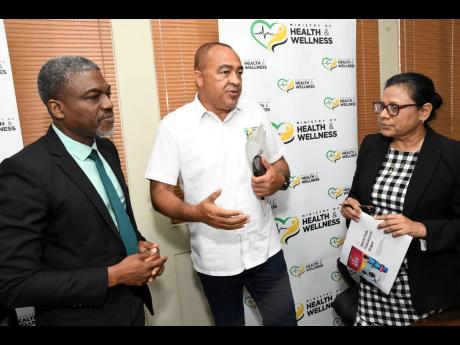Dengue cases to climb before tapering off in 2024
The number of dengue fever cases in Jamaica is expected to increase in the coming weeks before falling early next year, Health and Wellness Minister Dr Christopher Tufton has warned.
Speaking at a press conference on Thursday, Tufton shared that 3,147 suspected, presumed, and confirmed cases of dengue fever have been recorded.
Of this figure, he said 870 are confirmed cases, with dengue serotype 2 being the dominant strain, present in 863 of those cases.
Additionally, he said there had been two confirmed and seven suspected dengue-related deaths in the current outbreak, which was declared in September after the National Surveillance Unit advised that Jamaica had surpassed the dengue epidemic threshold for several months.
“We do anticipate based on the epidemiological assessment that we will continue to see the presence of the virus, perhaps on the rise going into the end of this year, and then dissipate over time in the first quarter of next year,” he said.
According to Tufton, within the last week, an average of 72 people with dengue fever have required hospitalisation, which has placed further strain on the health sector.
“Once you have a spike in one particular area, it does amplify the need for bed space ... and thereby creates, through the triaging process, the need for wait – longer waits,” he said.
The minister noted that the problem is further amplified by social patients he described as “bed blockers”, who occupy bed space, and pointed to the Spanish Town Hospital in St Catherine, where this is a major issue. But he stressed that the ministry is working to address the problem.
Addressing suggestions by Opposition Spokesman on Health Dr Morais Guy that there are more dengue fever cases than reported, Tufton stated that this is “not a cause for alarm. It is almost an expectation”.
“You never really capture all the cases, and in instances where those cases are mild, many persons opt to self-treat, or even if diagnosed, they take the time to rest to rehydrate, and so on. Remember now, ... most of the cases will be mild cases, but with proper treatment and rest, you can get over them. It is the severe cases that end up in the hospital system,” he said.
National Public Health Lab can test for Dengue
Chief Medical Officer Dr Jacquiline Bisasor McKenzie said the health ministry now has the capacity to test for the dengue virus at the National Public Health Lab, which has resulted in more confirmed cases than in the previous outbreaks of 2019 and 2016.
“In 2019, we had to depend quite a bit on results coming in from the Caribbean Public Health Agency in Trinidad, and there was a long delay in getting results. Now, we are getting results in 48 hours,” she said.
Bisasor McKenzie also noted that electronic reporting systems for hospitals have been established; however, she acknowledged that as some hospitals are still getting accustomed to them, this has resulted in delays in reporting.
According to the health ministry, all parishes continue to observe an increase in dengue cases with Kingston and St Andrew (776), having the highest number of cases.
St Thomas maintains the highest case rate of 382.5. per 100,000 population, followed by Portland (221 per 100,000) and Trelawny (160 per 100,000).
The 5-14 age group is the most affected, with the highest number of suspected, presumed, and confirmed cases at a rate of 360.3 cases per 100,000 population.
“This is in keeping with the fact that type two dengue, we have not seen it being prevalent for just over 10 years, and so you will find that persons in that age group have not previously been exposed to dengue type two, and so there is a high likelihood that they would be infected,” Bisasor McKenzie explained.
In the meantime, Tufton said the ministry continues to take steps to mitigate the impact of dengue on the population, through fogging, waste removal, and drain cleaning.

